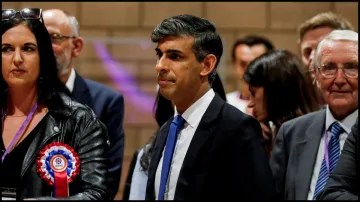UK Elections: Conservative leaders suffer 'bloodbath' as heavyweights lose their parliamentary seats
With almost all the results in, Labour had won 410 seats in the 650-seat House of Commons while Rishi Sunak's Conservatives have won only 118. A record number of senior ministers and heavyweight leaders lost their parliamentary seats, including former PM Liz Truss.

UK Elections 2024: One thing can be agreed upon in this year's UK Elections - it has been a disappointing night for Rishi Sunak's Conservatives. The Tories suffered a massive defeat to Keir Starmer's Labour Party, marking an end to the party's turbulent 14-year rule, and heavyweight casualties in several seats across Britain added to the misery of the Conservatives.
With almost all the results in, Labour had won 410 seats in the 650-seat House of Commons and the Conservatives 118. In the worst performance in the party's history, the Conservative Party saw a record number of senior ministers, including a former Prime Minister, defence secretaries and a possible future leader, lose their parliamentary seats in a series of catastrophic defeats in the elections.
Most shockingly, former PM Liz Truss, Sunak's predecessor, lost her South West Norfolk seat by a margin of only 600 seats. "We haven't delivered sufficiently on the policies people want," she told BBC, saying her party failed to keep taxes low or reduce immigration. When asked if she wants to stay in front-line Conservative politics, she says she needs "a bit of time" to think. The party's national vote also dropped to around 23 per cent, the lowest in the modern era.
List of Conservative ministers who lost their seats
While Sunak, Chancellor Jeremy Hunt, former secretary Suella Braverman and Home Secretary James Cleverly survived, a record procession of 12 cabinet ministers, along with some attending cabinet have been defeated, and 26 Tory candidates got so little of their local vote share they lost their deposits, according to Sky News.
Here are the ministers who lost their seats
- Grant Shapps - Defence Secretary
- Simon Hart - Chief Whip
- Gillian Keegan - Education Secretary
- Alex Chalk - Justice Secretary
- Penny Mordaunt - Commons leader
- Lucy Frazer - Culture Secretary
- Johnny Mercer - Veterans Minister
- Michelle Donelan - Science, Innovation and Technology Sectary
- David Davies - Wales Secretary
- Victoria Prentis - Attorney General
- Mark Harper - Transport Secretary
- Michael Tomlinson - Minister for Illegal Migration
Jacob Rees-Mogg, a prominent Brexiteer, lost his seat in North East Somerset, reflecting on his defeat by stating, “I couldn’t blame anybody other than myself” in an interview with the BBC. Sir Robert Buckland, the former justice secretary who also lost his seat, described his party’s electoral prospects as “electoral Armageddon,” attributing internal party divisions and “jockeying for position” for their downfall.
The Tories have lost seats once held by five of their former prime ministers - Finchley (Margaret Thatcher), Maidenhead (Theresa May), Henley (Boris Johnson), Witney (Lord Cameron) and Norfolk South West (Liz Truss). Anger at economic stagnation, political scandals and a crisis in public services after years of government spending cuts, saw voters desert the Conservative Party, which has governed in Britain longer than any other political party.
Other casualties included Peter Bottomley, who had been the longest-serving lawmaker in parliament. The 'Father of the House' - the honorary title bestowed upon the member who had been in parliament the longest - was first elected in 1975 but lost his Worthing West seat. The historic defeat leaves it depleted and in disarray and will likely spark an immediate contest to replace Sunak as leader.
What is next for Sunak?
Sunak left 10 Downing Street and arrived at the Tory headquarters in London, after which he will meet King Charles III at Buckingham Palace and tender his resignation. Sunak is also expected to resign as the leader of the Conservative Party, owing to its worst election performance in two centuries. Starmer will then be officially appointed as Prime Minister by the British monarch.
The king holds weekly meetings with the prime minister to discuss government matters. While the monarch is politically neutral, he still has right to “advise and warn” the prime minister if he believes it's necessary. These meetings are private and the matters discussed remain confidential.
"We did it," Starmer said in a victory speech. "Change begins now ... We said we would end the chaos, and we will, we said we would turn the page, and we have. Today, we start the next chapter, begin the work of change, the mission of national renewal and start to rebuild our country."
In a sign of the volatile public mood and anger at the system, the incoming Parliament will be more fractured and ideologically diverse than any for years. Smaller parties also gained, including the centrist Liberal Democrats with 70 votes and Nigel Farage’s far-right Reform UK and Green Party with four seats each. One of the biggest losers was the Scottish National Party, which held most of Scotland’s 57 seats but now has only nine seats.
Starmer also comes to power at a time when the country is facing a series of daunting challenges. Britain's tax burden is set to hit its highest since just after World War Two, net debt is almost equivalent to annual economic output, living standards have fallen, and public services are creaking, especially the much cherished National Health Service which has been dogged by strikes.
(with inputs from agencies)
ALSO READ | Who is Keir Starmer, the man behind Labour's historic victory in UK after 14 years? 10 POINTS